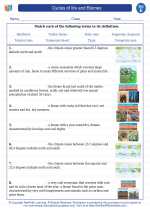Taxonomy: The Classification of Living Organisms
Taxonomy is the science of categorizing and naming living organisms. It is an essential tool for scientists to organize and understand the diversity of life on Earth. The modern system of taxonomy was developed by Carl Linnaeus in the 18th century and continues to be refined by biologists today.
Levels of Taxonomy
Organisms are classified into a hierarchical system with seven main levels:
- Kingdom: The broadest level of classification. There are currently five recognized kingdoms: Animalia, Plantae, Fungi, Protista, and Monera.
- Phylum: Each kingdom is divided into phyla, which group together organisms with similar body plans and characteristics.
- Class: Phyla are further divided into classes based on shared characteristics such as anatomy and physiology.
- Order: Classes are subdivided into orders. Organisms within the same order share even more specific similarities.
- Family: Orders are divided into families, which consist of closely related organisms.
- Genus: Families are further broken down into genera (plural of genus). Organisms within the same genus are more closely related than those in the same family.
- Species: The most specific level of classification. Organisms within the same species are capable of interbreeding and producing fertile offspring.
Binomial Nomenclature
Linnaeus also developed the system of binomial nomenclature, which assigns each species a unique two-part scientific name. The first part is the genus name, and the second part is the specific epithet. These names are always italicized or underlined and the first letter of the genus name is capitalized.
Study Guide
To study taxonomy effectively, consider the following key points:
- Memorize the seven levels of taxonomy in order, using the acronym "King Philip Came Over For Good Soup" as a mnemonic device.
- Understand the characteristics that define each level of taxonomy. For example, what features distinguish one phylum from another?
- Practice using binomial nomenclature by assigning scientific names to familiar organisms or identifying the genus and species of given names.
- Explore the diversity of life by studying examples of organisms within each kingdom and how they are classified at different taxonomic levels.
- Consider the evolutionary relationships between organisms as you study their taxonomy. How are closely related species grouped together?
By mastering the principles of taxonomy, you'll gain a deeper understanding of the interconnectedness and diversity of life on Earth.
[Taxonomy] Related Worksheets and Study Guides:
.◂Science Worksheets and Study Guides Fifth Grade. Cycles of life and Biomes
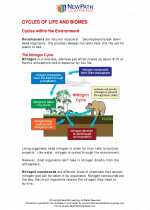
 Worksheet/Answer key
Worksheet/Answer key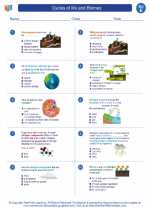
 Worksheet/Answer key
Worksheet/Answer key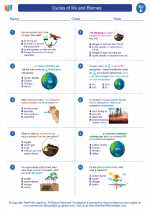
 Worksheet/Answer key
Worksheet/Answer key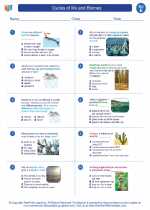
 Worksheet/Answer key
Worksheet/Answer key
 Vocabulary/Answer key
Vocabulary/Answer key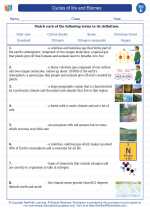
 Vocabulary/Answer key
Vocabulary/Answer key